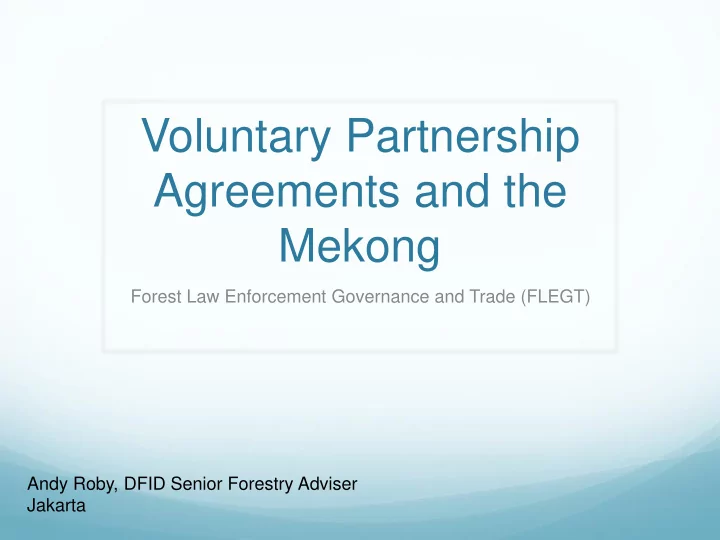

Voluntary Partnership Agreements and the Mekong Forest Law Enforcement Governance and Trade (FLEGT) Andy Roby, DFID Senior Forestry Adviser Jakarta
Who am I? Andy Roby Tropical forester (Bangor, Oxford), Henley MBA, 30 years working in international development (Africa, Latin America, Asia) including 5 years in the UK timber trade Current work: Indonesian timber licensing scheme to ensure only legal timber is exported to Europe – the so- called “FLEGT process”
Presentation 1. Forest Law Enforcement Governance and Trade (FLEGT) Action Plan 2. Voluntary Partnership Agreements (VPAs) 3. Non VPA countries 4. Company case study 5. An EU Action Plan?
1. FLEGT Forest Law Enforcement Governance and Trade (FLEGT) An EU Action Plan signed in 2003 Aimed at tackling illegal logging, in particular through trade measures Included development cooperation, private sector action, financial measures, further legislation and timber trade agreements (“VPAs”) The Trade element (i.e. the market) has proven critical, in Asia at least
Where FLEGT started
February 2003
The nature of the challenge Multiple forms – illegal logging can involve forestry, environmental, economic and social infractions No single definition – legality is defined in accordance with national legislation Consumers remain largely unaware that what they are buying may be illegal Many scales – from small to industrial or large scale Many perpetrators – from local communities to highest level of government Many agencies contribute to enforcement – police, customs, forest rangers, border guards, etc. Interaction between illegal timber and other trafficking
Example of the complexity of the challenge – model of Laos Timber Supply and Flows Source: EU FLEGT Facility, Study for understanding timber flows and control in Lao PDR, August 2012.
2. Voluntary Partnership Agreements (VPA) A legally-binding agreement between EU & Partner Country FLEGT Licenses give ready access to the EU which is now regulated by the EU Timber Regulation FLEGT licenses are based on Timber Legality Assurance Systems (TLAS) TLAS: - Legality Definition (based on national laws) - Controls of timber supply chains - Verification of compliance - Issuance of FLEGT licenses - Independent Audit Requires consultation amongst national stakeholders Helps to address governance weakness that drive illegal logging
Voluntary Partnership Agreements
FLEGT licenses (not yet) System development Formal negotiations Entering into negotiations Preparation, in-country consensus building Introduction to VPAs FLEGT dialogue FLEGT Laos Cambodia processes Myanmar in ASEAN Vietnam region Thailand Philippines Malaysia Indonesia
Situation in the Mekong Region (1) • Viet Nam – entered into VPA negotiations in Nov 2010 - Increasing engagement with private sector and CSOs during negotiation process - Conversion addressed in draft legality definition in accordance with regulations at small (i.e. household/community) and large (i.e. organisation/enterprise) scale - Aim to conclude negotiation in 2014 • Lao – announced interest in VPA negotiations in Feb 2012 - Technical and Support committees established, but National Steering Committee pending - Preparation at technical level ongoing with joint planning for a multi- stakeholder dialogue amongst govt, CSOs and private sector - First negotiation pending
Situation in the Mekong Region (2) • Thailand – entered into VPA negotiations in Feb 2013 - Negotiation structure set up - Royal Forest Department reaching out to other agencies & CSOs to assess the legal framework • Myanmar – showing broad interest in FLEGT/VPA - Forest sector and related reforms commencing - Ongoing FLEGT/VPA awareness raising amongst stakeholders - Various support projects/activities commencing • Cambodia – FA showing interest in FLEGT - FA set up an informal FLEGT Working Group in 2011 & prepared a roadmap toward negotiating a VPA agreement in June 2012 - Timber flow study recently completed
Factors determining how VPAs deal with forest conversion Magnitude/impact and awareness/concern of conversion during negotiations Whether the VPA process involves those that are primarily responsible for conversion (e.g. agro-industry, mining etc.) Whether local civil society is sufficiently informed about conversion to identify it as an issue to pursue though the VPA process Extent to which existing legislation provides conversion related safeguards in its design and implementation – that could then reflected in the LD/TLAS
Indonesian VPA The biggest, the first in Asia and the most advanced in terms of implementation 22m ha of forest “SVLK” audited representing perhaps 50% of log production Over 1,000 companies licensed to trade in SVLK timber Licensing of exports to the “V - Legal” standard fully operational and using the ASEAN national single window Licensing Information Unit issued over 80,000 export licenses for timber shipments
Indonesia’s SVLK – fatally flawed? There are some big implementation challenges before FLEGT timber licensing to Europe can begin eg: Logs from land clearance not properly controlled Auditors are not doing their work properly Independent monitoring by civil society Failed audits are not resulting in law enforcement These problems were highlighted in the first VPA EU-Indonesia assessment last year and echoed by the Anti-forestry mafia report in February this year A joint action plan was agreed the day after the VPA was signed and has now been published (March 2014) once both parties were comfortable and confident This is a nationally-owned multi-stakeholder process driving forward improvements - a way forward for other sectors, notably:
Recommend
More recommend